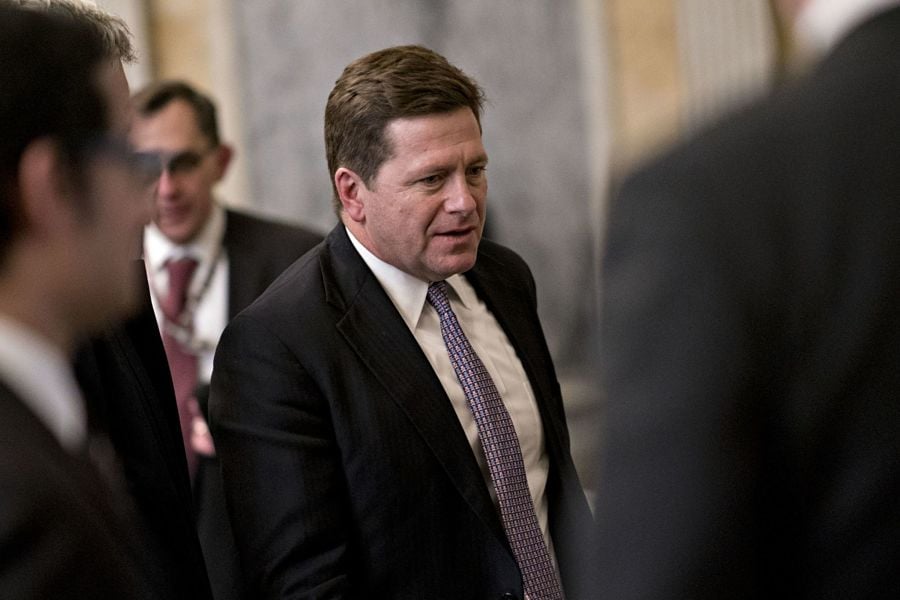

If Securities and Exchange Commission Chairman Jay Clayton departs the agency to become one of the nation’s most prominent federal prosecutors, it probably won’t have a significant impact on the regulatory agenda he leaves behind.
Major investment advice reform — Regulation Best Interest — is not likely to be affected because of the institutional momentum behind the rule, which would set a new standard for brokers. Clayton has gone out of his way to maintain the June 30 implementation date despite the COVID-19 pandemic.
Clayton also has put much political capital into reforming rules surrounding unregistered securities, known as private placements. He would like to open private markets to more ordinary investors. It’s not likely regulations in the pipeline will be upended, but if Clayton leaves his post, it could be harder for the remaining SEC members to address them.
“A lot depends on what happens during the interim period,” said Marc Ponchione, a partner at Debevoise & Plimpton LLP. “I wouldn’t expect any material shift away from his agenda on Reg BI and capital formation.”
On Reg BI, the agency already has indicated it’s going to move forward on examinations, although it said it is looking for “good faith” efforts to implement the measure given coronavirus disruptions.
“They’ve been resolute on [the rule] all the way through,” said Thomas Gorman, a partner at Dorsey & Whitney.
Although Reg BI is pretty much settled, pending the outcome of a lawsuit being heard in the 2nd U.S. Circuit Court of Appeals, a rulemaking and other work on changes to private offering rules is just beginning. If Clayton leaves the agency, three members would be left on the normally five-member SEC to deal with those reforms, which can spark disagreements among members.
“A divided SEC would require a degree of bipartisanship on a number of proposals that haven’t been finalized,” said Barbara Roper, director of investor protection at the Consumer Federation of America.
Whether and how long Clayton remains head of the SEC is unclear. A spokeswoman for Clayton as well as the SEC press office did not respond to requests for comment.
Controversy exploded when the White House announced late Friday night that President Donald Trump intended to nominate him to be the next U.S. Attorney for the Southern District of New York.
But the incumbent, Geoffrey Berman, initially refused to step down and was then fired by Trump later in the weekend. Mr. Berman had been investigating matters related to Trump’s real estate business and political allies.
Also over the weekend, Democratic senators urged Clayton to turn down the nomination. As of Monday morning, he was undecided about doing so, according to Bloomberg News. He also sent emails to SEC staff over the weekend saying that he intended to remain chairman through the nomination process and would be with the SEC for a “meaningful period of time.”
In an analysis released on Monday, Keefe Bruyette & Woods, a securities firm, speculated that the confirmation process for the U.S. attorney position would take months. “We expect [Clayton] to stay at the SEC through the end of the year unless he decides to leave the SEC earlier,” the analysis states.
Even if he is distracted by a tense Senate confirmation that drags on, Clayton is likely to retain a grip on the SEC reins.
“While Chairman Clayton is still chair, he’s going to continue with the agenda he has set out,” Ponchione said.
If Clayton does depart the agency this year — either to become a U.S. attorney or to concentrate on his confirmation — it would change the SEC’s political makeup.
Currently, Clayton, a political independent, presides over a commission that includes Republican members Hester Peirce and Elad Roisman and Democratic member Allison Herren Lee.
If Clayton leaves, it will be a three-member panel, and Lee’s leverage increases. When there are three SEC members, anyone of them can block a quorum by not participating in an open meeting. That could increase Lee’s leverage on issues such as private offering reform, about which she is skeptical.
“I don’t see her using that ability to deny a quorum extensively or rashly,” Roper said. “But it would significantly strengthen her hand in negotiations.”
Another wildcard is Caroline Crenshaw, who was nominated by Trump last week to fill a vacant Democratic seat on the commission. She will be going through a Senate confirmation process at the same time as Peirce, who was renominated for her seat.
Gorman hopes Clayton stays in place so that the agency won’t get caught in the crossfire over the U.S. attorney position.
“It would be very unfortunate if the SEC got embroiled in partisan politics,” Gorman said.

The 25-year industry veteran previously in charge of the Wall Street bank's advisor recruitment efforts is now fulfilling a similar role at a rival firm.

Former Northwestern Mutual advisors join firm for independence.

Executives from LPL Financial, Cresset Partners hired for key roles.

Geopolitical tension has been managed well by the markets.

December cut is still a possiblity.
Streamline your outreach with Aidentified's AI-driven solutions
This season’s market volatility: Positioning for rate relief, income growth and the AI rebound
